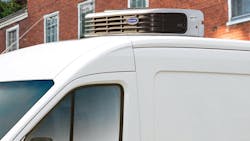Carrier Transicold recently introduced the all-electric Neos 200e transport refrigeration unit (TRU) for small electric and engine-powered delivery vehicles.
The new engineless unit, now available through Carriers’ North America dealer network, is part of the company’s growing portfolio of eCool all-electric TRUs designed to help refrigerated fleets reduce carbon emissions. It provides nearly 40% more cooling capacity with greater efficiency than its predecessor, Carrier said. It can take power from battery-electric vehicles or, with conventional engine-driven vehicles, use the alternator and battery, enabling constant temperature control for fresh and frozen items, regardless of engine speed.
“Neos 200e is ideal for florists, confectioners, grocers, and last-mile delivery businesses that want commercial-vehicle-level reliability and performance from a system that’s quiet, compact, and can help them achieve their sustainability goals,” Scott Parker, Carrier Transicold truck trailer Americas truck product manager, said in a news release.
“It delivers big results for small delivery vehicles.”
Neos 200e can be integrated into the vehicle or fitted externally. The main condenser assembly can be nose-mounted to the front of a truck box or mounted to the roof of a delivery van. A thin, ceiling-mounted evaporator maximizes interior cargo space.
Other features include:
- 12-volt architecture, making it fully compatible with 12-volt battery systems.
- Better cooling capacity thanks to a brazed-plate heat exchanger that provides better heat transfer, a larger evaporator coil and 60% more airflow with no increase in energy consumption compared to the unit it succeeds.
- Quiet performance due to its compact design and electric operation.
- Improved capacities at fresh and frozen setpoints due to the use of the new-generation refrigerant R-452A, which has about half the global warming potential of R-404A, the refrigerant traditionally used in most transport refrigeration units.
- Designed for reliability. Unlike conventional direct-drive systems, the compressor is housed inside the condenser rather than tied to the vehicle’s engine compartment. This eliminates long runs of refrigerant lines, reducing the amount of refrigerant needed and the potential for refrigerant leaks.
- Zero-direct-emissions performance. Utilizing a direct-current electric power source, the Neos 200e eliminates fuel consumption, carbon emissions and noise associated with engine-driven systems.
